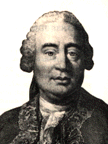

Hume carried the empiricism of Locke and George Berkeley to the logical extreme
of radical skepticism.
He repudiated the possibility of certain knowledge, finding in the mind nothing
but a series of sensations,
and held that cause-and-effect in the natural world derives solely from the
conjunction of two impressions.
Hume's skepticism is also evident in his writings on religion, in which he
rejected any rational or natural
theology. Besides his chief work, A Treatise of Human Nature (1739-40),
he wrote Political Discourses
(1752), The Natural History of Religion (1755), and a History of
England (1754-62) that was, despite
errors of fact, the standard work for many years.